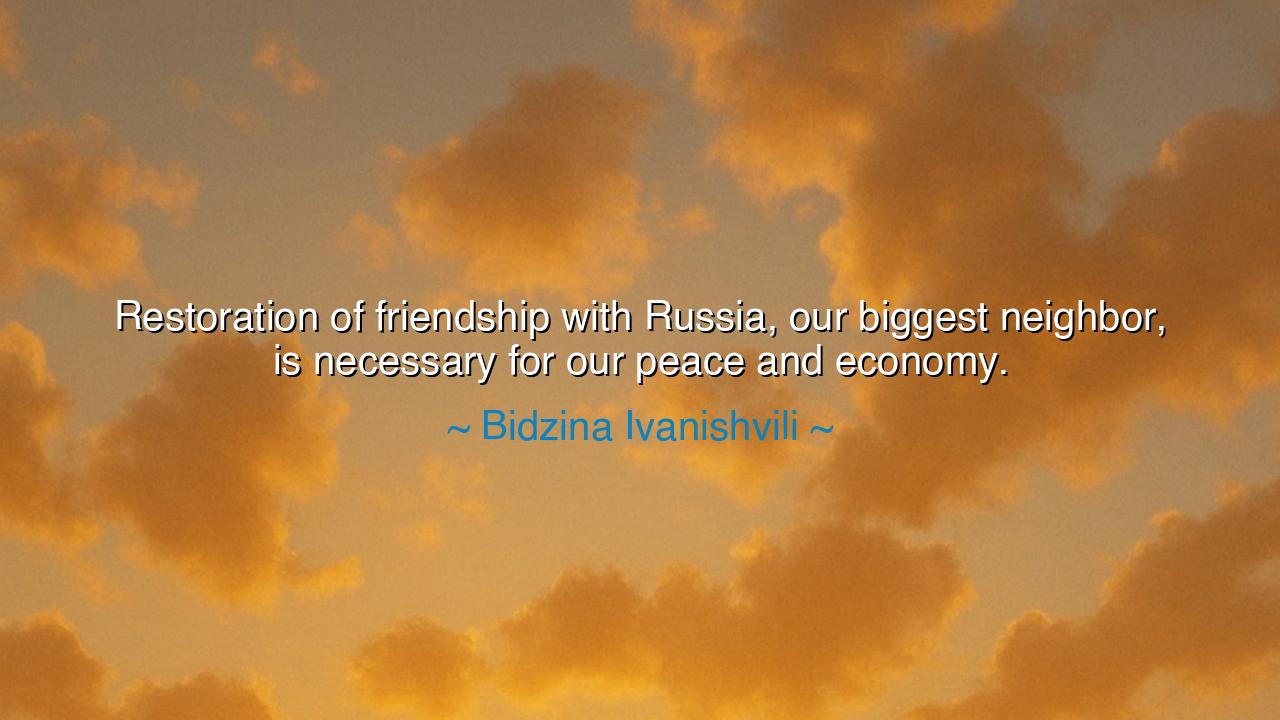
Restoration of friendship with Russia, our biggest neighbor, is
Restoration of friendship with Russia, our biggest neighbor, is necessary for our peace and economy.






In the chronicles of human history, the great powers of the world have often found themselves in conflict, divided by borders, ideals, and power struggles. Yet, it is in the reconciliation of these divides that true strength lies. Bidzina Ivanishvili, a leader whose wisdom is shaped by the weight of both the present and the past, speaks of the need for restoration: "The restoration of friendship with Russia, our biggest neighbor, is necessary for our peace and economy." In these words, we hear a call to heal the wounds of history and to find the path to unity and mutual prosperity. It is a reminder that the bonds between nations, much like those between individuals, are fragile, and it is only through understanding and reconciliation that true peace can be achieved.
The ancients knew that the path to peace was often paved with difficult decisions, but that these decisions were necessary for the survival and flourishing of communities. The bond between Rome and its neighbors, for instance, was marked not only by conquest but by alliances and careful diplomacy. Julius Caesar, though a conqueror, also understood the importance of alliances in keeping the peace within the Roman Empire. His ability to form alliances with Gaul, Germany, and even Egypt ensured that Rome could maintain its dominance without being torn apart by internal strife. The restoration of friendship with those who share borders, even with historical adversaries, is as critical today as it was in ancient times. The strength of a nation lies not only in its power but in its ability to find common ground with those around it.
Russia, in this context, represents more than just a neighboring nation. It is a force with which Georgia, like any other nation, must coexist, for geography binds them together. Just as Sparta could not thrive in isolation from its neighboring Peloponnesian cities, so too can no nation thrive in isolation from its larger, more influential neighbors. The peace and economy that Ivanishvili speaks of are intertwined with the realities of geography and mutual dependence. To dismiss the importance of restoring such ties is to ignore the lessons of history, where isolation often led to both internal instability and external threats. The ancient cities understood that prosperity was not just built on military strength but on the strength of alliances that allowed them to grow and flourish.
Consider, then, the example of Carthage and Rome, two great powers in the ancient world whose relationship was defined by both competition and cooperation. Though their conflicts, such as the Punic Wars, are legendary, the restoration of diplomatic relations after these wars eventually allowed Rome to extend its influence across the Mediterranean, aided in part by Carthage’s economic strength. Through peaceful negotiations and a shared desire for stability, both powers found a way to prosper. Even after the most bitter of conflicts, they realized that peace was not only a matter of ending war, but of creating relationships that fostered economic growth and security. Ivanishvili’s call for restoration echoes this timeless truth: lasting peace and prosperity are built not on perpetual division but on the courage to rebuild relationships.
The lesson that we can draw from this wisdom is clear: the ties that bind nations together are not always easy to form or maintain, but they are necessary for the well-being of all involved. Whether in the world of politics or in the realm of personal relationships, healing rifts and restoring trust is often the most difficult yet vital task. Like Ivanishvili, we must recognize that peace cannot be achieved through isolation but through the willingness to reconcile, to find the middle ground where both sides can prosper. The key is not in abandoning differences but in acknowledging them and choosing to build something stronger from those differences.
In our own lives, we may encounter conflicts that seem insurmountable—disagreements with family, colleagues, or friends that strain the bonds we once held dear. Yet, the lesson of restoration is one that speaks to the heart of human experience. We must not shy away from mending relationships, even when it seems like the path forward is unclear. Whether on the global stage or in our daily interactions, peace and prosperity are not gifts bestowed by circumstance, but fruits born of effort, humility, and the desire to see others not as adversaries but as partners in the shared journey of life.
Thus, let us take Ivanishvili’s words to heart: the strength of our nations, our communities, and our personal relationships lies not in our ability to remain divided but in our willingness to restore what has been broken. Whether it be in matters of diplomacy, economics, or friendship, let us remember that peace is not the absence of conflict, but the presence of understanding, effort, and cooperation. Just as Georgia must seek to restore its relationship with Russia, so too must we seek to restore the ties that bind us to one another in our own lives, for in those bonds lies our true strength.






AAdministratorAdministrator
Welcome, honored guests. Please leave a comment, we will respond soon